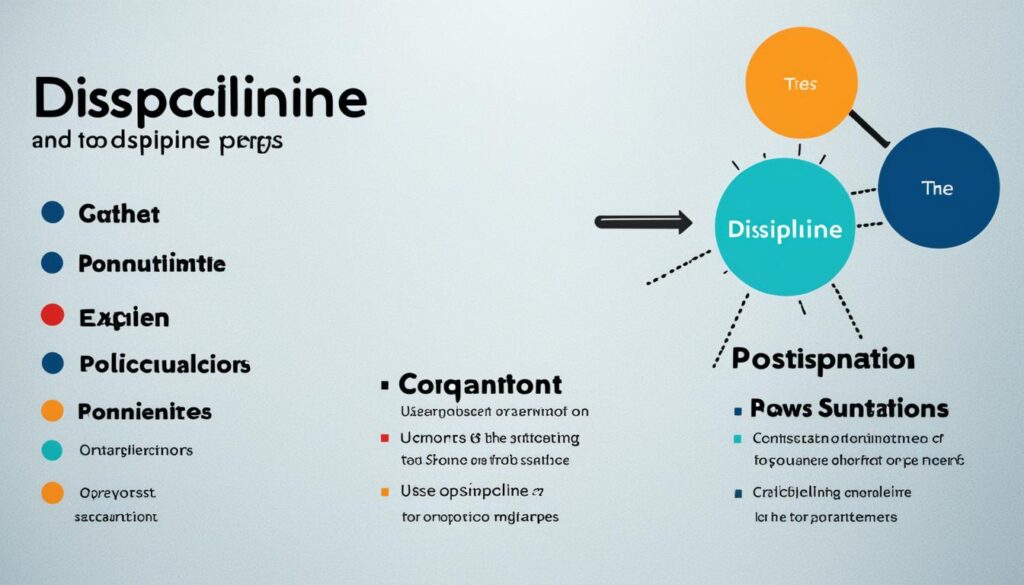Motivation vs Discipline Psychology: Key Insights

Have you ever found yourself inspired and motivated to achieve a goal, only to lose momentum along the way? Or perhaps you’ve come across tasks that require unwavering dedication and commitment, even when the initial excitement has faded. These are the moments where the interplay between motivation and discipline becomes crucial.
Let me share a personal experience that might resonate with you. A few years ago, I had a burning desire to start my own business. The idea of being my own boss, pursuing my passions, and creating something meaningful ignited a sense of motivation within me. I was filled with energy and enthusiasm, ready to take on the world.
However, as I delved into the journey of entrepreneurship, I quickly realized that motivation alone wasn’t enough. It provided the initial spark, but it couldn’t sustain me through the challenges, setbacks, and countless hours of hard work. That’s when I discovered the power of discipline.
Discipline became my guiding force, the unwavering commitment that kept me going when things got tough. It helped me stay focused, prioritize tasks, and maintain consistency in my actions. Discipline pushed me to step out of my comfort zone, learn new skills, and persevere even when obstacles seemed insurmountable.
Through this personal journey, I learned that motivation and discipline are two sides of the same coin. They are intertwined and complement each other, forming the foundation for personal growth and achievement. It’s not a matter of choosing one over the other, but rather understanding how they work together to unlock our full potential.
In this article, we will explore the psychology of motivation and discipline, their differences, and how they can be harnessed to fuel success. So, let’s dive in and discover the key insights that will empower you on your own path to greatness.
Key Takeaways:
- Motivation and discipline are essential pillars of success.
- Motivation refers to the psychological forces that drive us to initiate and persist with behaviors that lead to goal achievement.
- Discipline is the ability to make and keep commitments, do the right thing even when it’s challenging, and honor commitments.
- Motivation provides the initial inspiration, while discipline sustains progress and helps overcome obstacles.
- Understanding the interplay between motivation and discipline can unlock your potential for personal and professional growth.
Understanding Motivation
Motivation is the driving force behind our actions. It is what propels us towards our goals and keeps us focused on achieving them. Without motivation, it becomes challenging to stay committed and dedicated to a task or objective.
When it comes to motivation, there are two distinct types: extrinsic motivation and intrinsic motivation.
Extrinsic motivation is driven by external rewards or the desire to avoid punishment. It involves seeking recognition, financial incentives, or other forms of external validation. For example, in the workplace, receiving a raise, gaining industry influence, or making more money are common sources of extrinsic motivation.
Intrinsic motivation, on the other hand, comes from within. It is driven by the joy and satisfaction we derive from an activity itself. When we are intrinsically motivated, the activity becomes its own reward. In the workplace, intrinsic motivation can manifest as taking pride in one’s work, seeking personal development opportunities, or feeling that the work makes a positive difference in the world.
Understanding the different types of motivation is vital because it enables us to recognize and nurture what truly inspires and drives us. While external rewards may provide temporary motivation, it is the internal satisfaction and joy derived from an activity that sustains our motivation in the long run.
The Power of Intrinsic Motivation
Intrinsic motivation is a powerful force that can lead to higher levels of engagement, creativity, and satisfaction in both personal and professional pursuits. When we are intrinsically motivated, we are more likely to go above and beyond, take initiative, and persist in the face of challenges. This internal drive fuels our passion and enables us to find joy and fulfillment in our work.
Intrinsic motivation is deeply personal and unique to each individual. It is essential to explore and understand our intrinsic motivators to unlock our full potential and lead a fulfilling life. By aligning our goals and actions with our core values and passions, we can harness the power of intrinsic motivation, propelling us towards success and personal growth.
Next, we will delve into the concept of discipline and its role in achieving goals.
Understanding Discipline
Discipline is a fundamental aspect of psychology that encompasses the ability to regulate and correct our behavior in order to achieve long-term goals. It goes beyond mere willpower or self-control and extends to making and keeping promises, honoring commitments, and doing the right thing even when faced with challenges or temptations. Discipline is an essential skill that can be developed and strengthened through practice, and it plays a crucial role in personal and professional success.
The Role of Self-Discipline Psychology
In psychology, the study of discipline is often referred to as self-discipline psychology. This field focuses on understanding the cognitive and behavioral processes involved in maintaining self-control, overcoming procrastination, and resisting distractions. Self-discipline psychology explores the factors that contribute to the development of discipline and provides strategies for individuals to enhance their self-discipline.
“Discipline is the bridge between goals and accomplishment.” – Jim Rohn
Discipline helps us overcome the temptations and distractions that can hinder our progress towards our goals. It allows us to stay focused, make consistent efforts, and maintain a sense of purpose even when faced with difficulties. By practicing discipline, we create a structure that supports our aspirations and motivates us to take the necessary actions to achieve our desired outcomes.
The Benefits of Discipline
Developing discipline has numerous benefits across various areas of life:
- Enhanced productivity: Discipline helps us stay focused and organized, leading to increased productivity and efficiency in our work and daily tasks.
- Improved time management: With discipline, we can prioritize our tasks, manage our time effectively, and avoid procrastination.
- Greater self-confidence: The ability to follow through on commitments and achieve our goals builds self-confidence and a sense of accomplishment.
- Increased resilience: Discipline enables us to persevere in the face of challenges, setbacks, and obstacles, fostering resilience and a growth mindset.
- Stronger relationships: Discipline fosters trust, reliability, and consistency, enhancing our relationships both personally and professionally.
| Discipline Strategies | Benefits |
|---|---|
| Goal setting and planning | Provides clarity and direction |
| Creating daily routines | Establishes structure and consistency |
| Maintaining focus and avoiding distractions | Increases productivity and efficiency |
| Building resilience through self-reflection | Promotes personal growth and learning |
| Accountability and tracking progress | Ensures commitment and motivation |
By incorporating discipline into our lives, we can experience these benefits and create a foundation for achieving our goals and aspirations.
The Difference Between Motivation and Discipline
While motivation and discipline are closely related, they have distinct characteristics. Motivation is the driving force behind our actions, providing the initial burst of inspiration that propels us forward. It is what fuels our desire to make a difference and achieve our goals. Motivation is the internal compass that guides us on our journey to personal growth and success.
On the other hand, discipline is about the actions we take. It is what keeps us going even when the initial motivation fades. Discipline is the unwavering commitment and self-control needed to stay on track and overcome obstacles. It is the determination and perseverance that enable us to push through challenges and continue making progress.
While motivation focuses on the why behind our actions, discipline focuses on the how. Motivation provides the inspiration, while discipline provides the structure and framework for action. When combined, motivation and discipline form a powerful duo that propels us towards achieving our goals and realizing our full potential.
It’s important to note that while motivation can be temporary and fluctuate depending on external factors, discipline is a skill that can be developed and strengthened over time. It is through discipline that we cultivate habits, establish routines, and create a sense of accountability that keeps us aligned with our goals, even when motivation may waver.
To better understand the differences between motivation and discipline, let’s take a closer look at some key distinctions:
- Motivation: The driving force behind our actions.
- Discipline: The commitment and self-control needed to stay on track.
- Motivation: Fueled by the desire to make a difference and achieve goals.
- Discipline: Provides the structure and framework for action.
- Motivation: Can fluctuate depending on external factors.
- Discipline: A skill that can be developed and strengthened over time.
By understanding and harnessing the power of motivation and discipline, we can create a solid foundation for personal growth and achievement. Motivation provides the initial spark, while discipline ensures that we stay the course and overcome obstacles along the way. Together, they form a powerful combination that propels us towards realizing our full potential.
A Comparison of Motivation and Discipline
| Aspect | Motivation | Discipline |
|---|---|---|
| Definition | The driving force behind our actions | The commitment and self-control needed to stay on track |
| Focus | The why behind our actions | The how behind our actions |
| Nature | Can fluctuate and be influenced by external factors | A skill that can be developed and strengthened over time |
The Importance of Motivation
Motivation is the driving force that propels individuals to overcome challenges and achieve their goals. Whether you’re an entrepreneur embarking on a new venture or an individual striving for personal growth, motivation is crucial for success. It provides the fuel and passion needed to persevere through difficult times, inspire others to join the mission, and maintain consistent effort.
When it comes to entrepreneurship, motivation plays a vital role in attracting investors and convincing them to fund your startup. It showcases your belief in the project and inspires confidence in others. Motivation is also essential in the early stages of building a business, as it helps rally employees around a common purpose and encourages them to give their best.
But motivation goes beyond business endeavors. In all aspects of life, motivation is what drives individuals to push beyond their limits, embrace challenges, and achieve their dreams. It is the driving force that keeps you focused, determined, and resilient in the face of obstacles.
When it comes to psychology, motivation is a subject of great interest. Psychologists study motivation strategies and the inner workings of the human mind to understand what fuels our desires and aspirations. By understanding the underlying principles of motivation, individuals can harness its power to propel themselves forward and achieve their goals.
Motivation Strategies
There are various motivation strategies that individuals can employ to stay motivated and focused on their goals. Some effective strategies include:
- Setting clear and specific goals
- Creating a vision board or visual reminders
- Breaking down big goals into smaller, achievable tasks
- Rewarding progress and celebrating accomplishments
- Surrounding yourself with positive and supportive people
By incorporating these strategies into your daily life, you can enhance your motivation and increase your chances of success.
The Power of Discipline
Discipline is the force that propels us forward even when motivation falters. It empowers us to push beyond our limits, go the extra mile, and stay focused on what truly matters. With discipline, we can resist the allure of distractions, conquer the urge to procrastinate, and remain steadfast in our commitment to our goals. It is the key to consistency, productivity, and long-term success.
Developing discipline is a journey that requires creating effective habits, setting clear expectations, and fostering an environment that nourishes focus and discipline. By cultivating discipline, we gain the power to shape our own destiny and unlock our full potential.
“Discipline is the bridge between goals and accomplishment.” – Jim Rohn
One of the hallmarks of discipline is the ability to establish consistent routines. By integrating deliberate practices into our daily lives, we create a structure that supports our goals and keeps us on track. Small acts of discipline, performed consistently over time, build momentum and pave the way for significant achievements.
Self-discipline is a psychological skill that can be honed and strengthened through practice. It requires a deep understanding of our own behavior patterns, strengths, and weaknesses. By identifying the habits and routines that align with our goals, we can implement discipline techniques that reinforce positive actions and minimize distractions.
Creating Habits
Habits are the building blocks of discipline. When we transform desired behaviors into automatic routines, we reduce the reliance on willpower and increase the likelihood of consistent action. Start by identifying the habits that align with your goals and create a plan to incorporate them into your daily life. Be mindful of triggers and cues that prompt the desired behavior and celebrate each successful implementation of the habit.
Fostering Focus
Creating an environment that fosters focus is crucial for maintaining discipline. Minimize distractions by removing digital temptations, organizing your workspace, and establishing clear boundaries between work and leisure. Set aside dedicated time for deep work, uninterrupted by interruptions or notifications. By eliminating distractions and cultivating focus, you pave the way for sustained concentration and higher productivity.
Setting Clear Expectations
Clear expectations serve as guideposts on the path of discipline. Define your goals and objectives with precision, breaking them down into manageable milestones. Clearly articulate your desired outcomes and set deadlines to create a sense of urgency. By setting clear expectations for yourself, you provide a roadmap for disciplined action and hold yourself accountable for consistent progress.
Discipline is an essential ingredient in the pursuit of personal growth and achievement. It is the backbone of success, allowing us to navigate challenges, conquer adversity, and stay committed to our aspirations. Embrace the power of discipline, and you will unlock the door to limitless possibilities.

Motivation and Discipline in the Workplace
Motivation and discipline are not only crucial for individual success but also play a vital role in creating a thriving workplace environment. Whether you are an employer or an employee, understanding and harnessing both motivation and discipline can significantly impact productivity and overall success.
Starting with why is the foundation for cultivating motivation and discipline in the workplace. Reminding the team of the company’s mission and purpose can ignite a sense of intrinsic motivation and fuel their commitment to their work. When employees understand the impact of their contributions, they are more likely to remain motivated and focused on achieving their goals.
Offering opportunities for ownership is an effective way to promote motivation and discipline. Providing employees with autonomy and allowing them to take ownership of their work gives them a sense of responsibility and control, which can increase their drive to perform at their best.
“Motivation is what gets you started. Discipline is what keeps you going.” – Jim Rohn
Celebrating wins and tracking progress are vital to maintaining motivation and discipline in the workplace. Recognizing achievements and milestones, whether big or small, can boost morale and reinforce the importance of hard work. Regular progress checks also allow individuals and teams to stay on track and make adjustments as needed, keeping motivation and discipline at the forefront.
Fostering connections among team members is another powerful way to enhance motivation and discipline. When employees feel a sense of belonging and camaraderie within their team, they are more likely to support one another, share their expertise, and work collaboratively towards shared goals. This sense of connection can foster a positive and motivating work environment.
By understanding the importance of both motivation and discipline in the workplace, employers and employees can create an environment that supports and encourages personal and professional growth. When motivation and discipline are nurtured and prioritized, individuals and teams can thrive, leading to increased productivity, engagement, and overall success.
Creating an Environment of Discipline
Creating an environment that fosters discipline is essential for individuals and teams to stay on track and achieve their goals. By eliminating distractions, establishing clear expectations, and providing tools to support focus and self-discipline, a disciplined environment can be cultivated.
One effective way to foster discipline is to eliminate or minimize distractions, such as social media or unnecessary notifications. These distractions can derail individuals from their tasks and hinder productivity. By creating boundaries and setting aside designated periods for focused work, individuals can maintain their discipline and avoid succumbing to distractions.
Establishing clear expectations is another crucial aspect of creating a disciplined environment. When individuals have a clear understanding of what is expected of them and the goals they need to achieve, it becomes easier to stay disciplined. Clear expectations provide a sense of direction and purpose, motivating individuals to maintain their discipline and work towards their objectives.
Providing tools and resources that support focus and self-discipline is also important. These can include time management techniques, goal-setting frameworks, or productivity apps. By equipping individuals with the necessary tools to manage their time effectively and prioritize tasks, self-discipline is strengthened, and progress is made towards goals.
Implementing clear communication and accountability systems further enhances discipline. Regular check-ins, progress updates, and open feedback channels create a culture of responsibility and discipline. When individuals feel that their efforts are seen and recognized, they are more likely to stay committed and disciplined in their work.
A disciplined environment is crucial for individuals and teams to thrive. By creating an environment that eliminates distractions, establishes clear expectations, provides tools for focus and self-discipline, and implements communication and accountability systems, discipline can flourish. This environment sets the stage for achieving goals, fostering growth, and ultimately leading to success.
Creating a disciplined environment is like setting the stage for success. It provides the foundation on which individuals and teams can build their discipline and achieve greatness.
| Benefits of a Disciplined Environment | How to Create a Disciplined Environment |
|---|---|
|
|
By implementing these strategies, individuals and teams can create an environment that fosters discipline and sets them up for success. Discipline techniques in psychology and self-discipline psychology can be applied to shape a culture that values discipline and rewards achievements. When discipline becomes ingrained in the environment, individuals are empowered to stay on track, overcome obstacles, and achieve their goals.
For more in-depth information on discipline techniques in psychology, refer to this in-depth study on discipline strategies. It explores various psychological approaches to cultivating discipline and self-control, offering valuable insights for individuals seeking to enhance their discipline.
Using Motivation to Drive Discipline
Motivation can be a powerful tool in cultivating discipline. By understanding what motivates individuals and aligning their goals with their intrinsic motivations, leaders can inspire and empower their teams to take disciplined actions.
One effective strategy is to celebrate progress along the way. Recognizing achievements, no matter how small, can fuel motivation and inspire individuals to stay committed to their goals. It provides a sense of accomplishment and reinforces the importance of disciplined actions.
Furthermore, providing opportunities for growth and development can enhance motivation and drive disciplined behaviors. When individuals see a clear path for personal and professional growth, they are more likely to stay motivated and maintain the discipline needed to reach their goals.
“Motivation is what gets you started. Discipline is what keeps you going.” – Jim Rohn
Creating a Sense of Purpose
A sense of purpose can be a powerful motivator. When individuals understand how their actions contribute to a larger vision or mission, they are more likely to stay motivated and maintain discipline. Leaders can foster a sense of purpose by communicating the impact of the work and connecting it to a greater cause.
Using motivation as a guiding force can help individuals and teams overcome challenges and stay committed. By tapping into what drives them, leaders can inspire disciplined actions that lead to desired outcomes. Motivation and discipline work hand in hand, creating a synergistic relationship that propels individuals towards success.
Discipline as a Tool to Maintain Motivation
Discipline is not just about self-control; it is also an effective tool for maintaining motivation. By establishing discipline in our daily routines, habits, and behaviors, we create a framework for consistent effort and progress. This discipline helps us stay focused on our goals, resist distractions, and overcome obstacles along the way.
When we face challenges or encounter setbacks, discipline acts as a support system that keeps our motivation alive. It reminds us of the progress we’ve made, the accomplishments we’ve achieved, and the purpose behind our actions. Discipline provides the structure and stability we need to keep moving forward, even when the going gets tough.
Just as a well-disciplined athlete follows a training regimen to maintain peak performance, we can apply discipline techniques in psychology to maintain our motivation. These techniques include setting clear goals, creating action plans, and adhering to a schedule. By maintaining these disciplined practices, we foster a sense of responsibility and accountability to ourselves and our goals.
Moreover, discipline can fuel motivation by creating a sense of accomplishment. When we consistently follow through on our commitments, we experience progress and a sense of fulfillment. This, in turn, bolsters our motivation and propels us towards further success.
Imagine a musician who practices their instrument daily, even when they don’t feel motivated. The discipline they exhibit fuels their motivation as they see their skills improve over time. The same principle applies to any endeavor in life. By employing discipline as a tool to maintain motivation, we can stay committed, resilient, and driven towards achieving our desired outcomes.
To illustrate the power of discipline in maintaining motivation, consider the following table:
| Benefits of Discipline in Motivation | Examples |
|---|---|
| Consistency | Following a regular exercise routine to stay motivated for fitness goals. |
| Focus | Eliminating distractions and creating dedicated time for studying to maintain motivation for academic success. |
| Resilience | Continuing to work on a project despite setbacks, maintaining motivation to achieve desired outcomes. |
| Progress | Celebrating milestones and reflecting on achievements to stay motivated on a long-term project. |
| Overcoming Challenges | Staying committed to healthy eating habits even when tempted, maintaining motivation for overall well-being. |
As this table demonstrates, discipline plays a vital role in maintaining motivation in various aspects of life. By incorporating discipline techniques in psychology and embracing a disciplined mindset, we can foster a sustainable and enduring motivation that propels us towards our goals.
Making Discipline Actionable
To achieve long-term goals, it is crucial to have a clear understanding of the right behaviors and habits that align with those goals. Making discipline actionable involves proactively deciding on the necessary actions and committing to them wholeheartedly. By asking ourselves questions such as “What is the right thing to do?” and treating our motivations as valuable inputs, we can effectively guide our disciplined actions. It’s important to remember that discipline is not just about self-control, but also about making intentional choices based on our values and long-term aspirations.
Linking discipline to positive feelings and rewards can further reinforce disciplined behaviors and make them more sustainable. By associating the act of discipline with a sense of achievement, satisfaction, or progress, we can create a positive feedback loop that motivates us to stay committed. Additionally, celebrating milestones along the way and rewarding ourselves for adhering to disciplined practices can help foster a sense of fulfillment and further fuel our determination.
The Power of Self-Discipline Strategies
“Discipline is the bridge between goals and accomplishments.” – Jim Rohn
Developing effective discipline techniques in psychology can significantly enhance our ability to take consistent action and achieve desired outcomes. Here are some self-discipline strategies to help make discipline actionable:
- Create a structured routine: Setting a schedule and adhering to it helps establish a sense of consistency and order in our daily lives.
- Break tasks into manageable chunks: Breaking down larger tasks into smaller, more manageable steps can make them less daunting and easier to tackle.
- Practice accountability: Share your goals and progress with a trusted friend or mentor who can help hold you accountable for your actions and provide support along the way.
- Remove distractions: Minimize potential distractions by creating a designated workspace, turning off notifications, and practicing concentration techniques such as time blocking.
- Cultivate a growth mindset: Embrace challenges as opportunities for growth and view setbacks as learning experiences that propel you forward.
By consistently implementing these discipline strategies and fine-tuning your approach based on your own experiences, you can harness the power of self-discipline techniques in psychology to make discipline actionable and achieve your long-term goals.
| Benefits of Making Discipline Actionable | Examples |
|---|---|
| Increased productivity | Completing projects ahead of schedule |
| Improved time management | Consistently prioritizing important tasks |
| Greater self-confidence | Accomplishing challenging goals |
| Enhanced focus and concentration | Reducing distractions and maintaining attention |
By incorporating discipline techniques in psychology and making discipline actionable, you can experience numerous benefits that contribute to personal growth and achievement. From increased productivity and improved time management to greater self-confidence and enhanced focus, disciplining yourself lays the foundation for success in all areas of life.
Conclusion
Both motivation and discipline are crucial elements in the journey of personal growth and achievement. While motivation serves as the initial spark and driving force, discipline provides the structure and resilience to overcome obstacles along the way. Motivation and discipline are intertwined, with motivation fueling our actions and discipline acting as the roadmap for consistent progress.
By understanding the power of motivation and discipline, individuals can unlock their full potential and thrive in both their personal and professional lives. Motivation psychology teaches us about the different types of motivation, whether it’s the extrinsic drive of external rewards or the intrinsic satisfaction derived from meaningful work. On the other hand, discipline psychology highlights the importance of self-discipline, commitment, and the ability to stay focused on long-term goals.
Embracing both motivation and discipline is like having a powerful engine and a well-maintained vehicle. Motivation sets us in motion and fuels our passion, while discipline ensures that we stay on the right path, maintain consistency, and navigate through challenges. The integration of both elements is essential for sustained success and personal fulfillment.
So, whether it’s starting a new venture, pursuing a lifelong dream, or simply striving for personal excellence, motivation and discipline will be your faithful companions. Understanding the dynamics between motivation and discipline and applying them in your life will assist you in unlocking your true potential and achieving remarkable growth.






